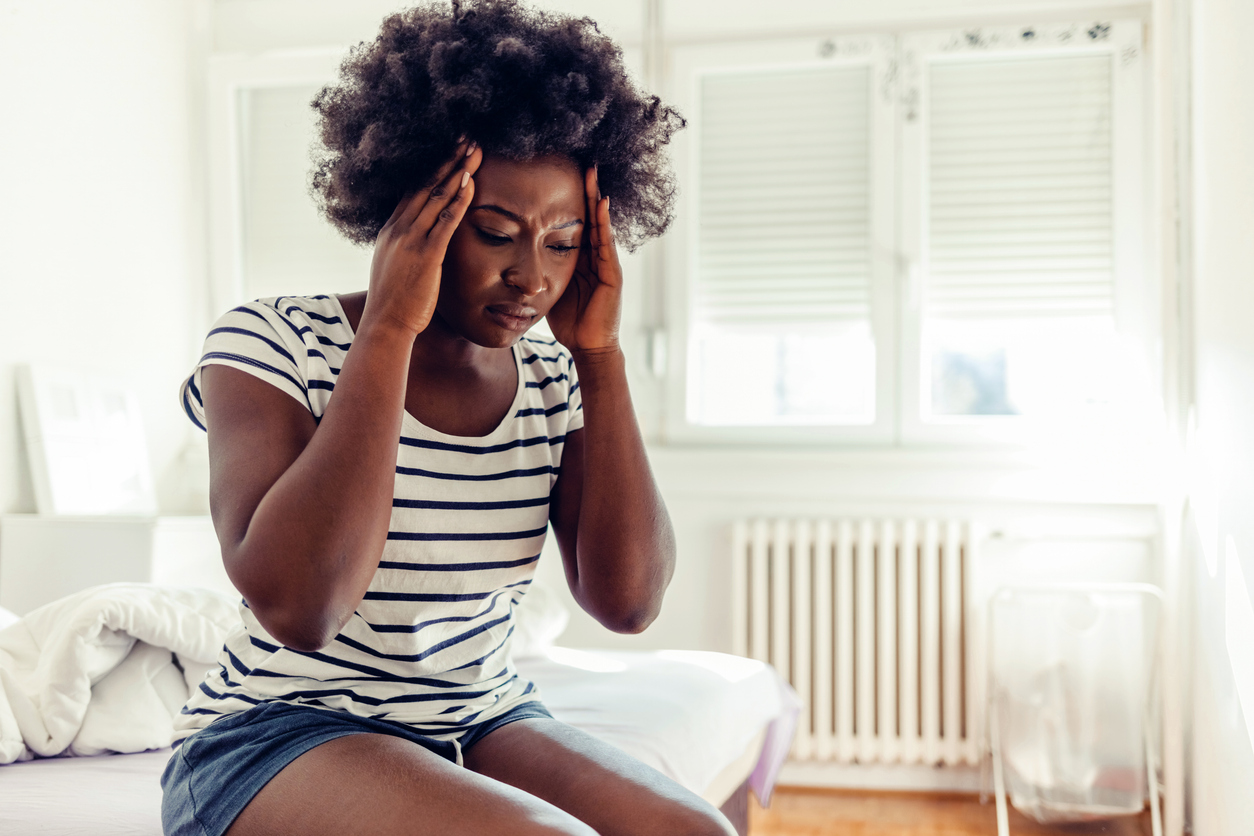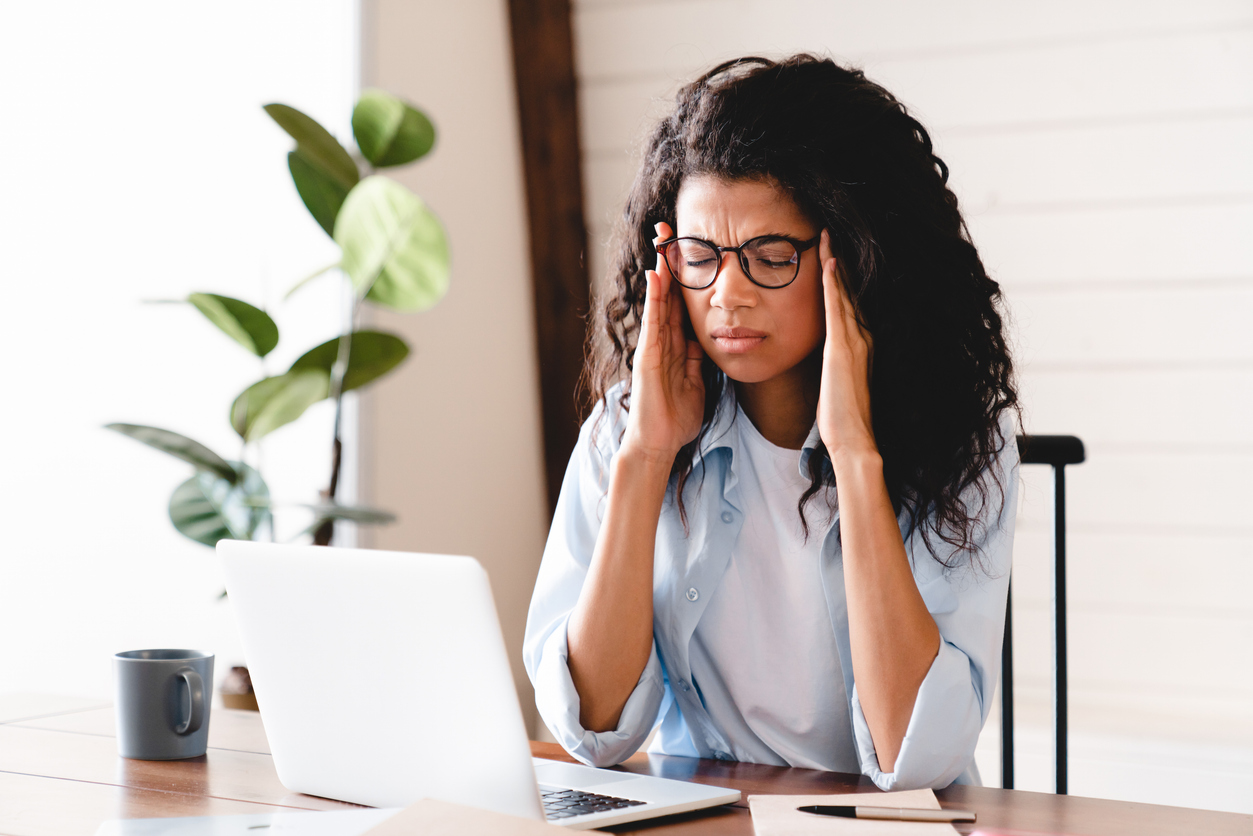This article was supported by Pfizer Medical Affairs
If you’ve ever been knocked out by a killer headache just before your period, you’re not alone. Two out of three women with migraine experience it around the same time as their period. Understanding the link between hormones and migraine attacks can empower you to take control of your health and find effective ways to manage the pain. Now let’s explore hormonal migraine, which hormones typically trigger an attack, and practical management strategies to feel your best.

What are hormonal migraines?
Hormones sure know how to keep things interesting (sarcasm intended). Hormonal migraines are painful headaches triggered by fluctuations in hormone levels, particularly estrogen. These hormonal shifts, especially at the start of a woman’s menstrual cycle, can trigger more intense and prolonged migraine attacks. They can also last longer and cause extreme sensitivity to light.
There are two different types of hormonal migraine:
- Menstrual migraine: Also known as period migraine, menstrual migraine is caused by hormonal changes that occur two to three days before your period and the third day of your cycle. Right before your period, estrogen levels rapidly drop, and this sudden dip can set off a migraine attack. And just to keep things interesting, you might also get hit with one during or after your period. Fun, right?
- Menopause migraine: While menopause generally leads to more stable hormone levels and fewer migraine attacks, the transition to menopause, also known as perimenopause, can exacerbate migraine symptoms. During perimenopause, irregular periods can cause unpredictable hormone fluctuations, often triggering more frequent and intense migraine episodes.

Symptoms of hormonal migraines
Symptoms of hormonal migraines are usually similar to regular migraines but are more intense and longer-lasting. If you’ve ever experienced one, you know how debilitating it can be. Common symptoms include:
- Throbbing or pulsating head pain
- Sensitivity to light, sound, or smells
- Visual disturbances (aura)
- Nausea
- Vomiting
- Abdominal pain
- Loss of appetite
- Dizziness
- Fatigue
Tracking your symptoms in a migraine journal or app can help you identify patterns, so you can adjust your routine as necessary (like canceling plans and having a "veg-out" day!). Track the timing of each migraine attack, the severity, as well as any accompanying symptoms, to help determine your triggers and which migraine management options work best for you.
How to manage hormonal migraines
Experiencing hormonal migraine can be a real pain (literally), but there are ways to keep symptoms in check and find relief. Here are some tips to help you feel your best:

Preventing hormonal migraines with lifestyle tweaks
Making small lifestyle changes can have a big impact on preventing a migraine headache. For sustainable results, gradually incorporate these adjustments into your routine:
- Stay hydrated: Dehydration is a common migraine trigger, so it’s important to drink plenty of water throughout the day. Keep a water bottle handy or snack on hydrating fruits and vegetables like cucumbers, melons, or berries. If plain water feels boring, spice it up with a splash of freshly squeezed citrus or a few sprigs of fresh herbs for a little extra flavor. Plus, you'll look effortlessly fancy strolling around with your fruit or herb-infused water.
-
Prioritize sleep: A consistent sleep schedule balances hormones, repairs the body and mind, and reduces the risk of a migraine attack. Aim for 7 to 8 hours of quality sleep each night. If you struggle with sleep around your period, establish a relaxing bedtime routine to help you drift off, such as:
- A warm bath to relax your muscles (add in some Epsom salts for extra relaxation!).
- Deep breathing or gentle stretches before getting in bed.
- Ditch the screens at least an hour before bedtime.
- Keep your bedroom cool and dark.
- Swap doom-scrolling for a book or meditation (your future well-rested self will thank you!).
- Don't skip meals: Skipping meals or eating highly processed foods can trigger a migraine headache. Eat balanced meals with plenty of whole fruits and vegetables, protein, fiber-rich carbohydrates, and healthy fats to keep your blood sugar stable, your body nourished, and to reduce the risk of period migraine.
- Manage stress: Stress is a potential migraine trigger, and constantly worrying about your next attack only adds to the cycle of stress. Incorporate stress-relieving activities like meditation, deep breathing, gentle yoga, or short daily walks to relax your body and mind.

Consider supplements
Many migraine-sufferers find relief from supplements, such as:
- Magnesium: Some studies have shown that high-dose magnesium can reduce migraine attack frequency.
- Riboflavin (vitamin B2): High-dose riboflavin can reduce attack frequency and headache days.
- Coenzyme Q10 (CoQ10): Regular intake of CoQ10 can reduce the frequency and intensity of a migraine headache.
Before adding any supplements to your routine, check in with your healthcare provider to make sure they're the right fit for you.

The importance of managing symptoms of hormonal migraine
Dealing with hormonal migraine can be exhausting and disruptive. Learning to manage your symptoms is crucial for your quality of life and overall health. Plus, it will help you feel more like yourself and keep your daily life from being ruled by headaches. If your migraine is severe or just won’t quit, don’t tough it out alone. Reach out to a healthcare provider for support and a personalized treatment plan. Take care of yourself — you deserve it.
Dahlia Rimmon is freelance writer, editor, and registered dietitian. She writes for various publications and family-focused brands, covering everything from food and supplements to overall health and wellness. Her experience spans private practice, consulting, and working in the baby food industry. She lives in St. Louis with her family.








.png)








